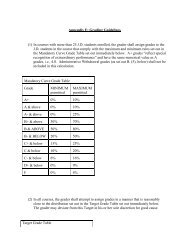LAWYERS' ETHICS - Hofstra University School of Law
LAWYERS' ETHICS - Hofstra University School of Law
LAWYERS' ETHICS - Hofstra University School of Law
Create successful ePaper yourself
Turn your PDF publications into a flip-book with our unique Google optimized e-Paper software.
GRADING AND EVALUATION<br />
Class Performance/Participation (20%): In an effort to help you learn how<br />
lawyers actually grapple with ethical dilemmas in practice, a significant<br />
portion <strong>of</strong> class time will involve discussions and simulated legal arguments<br />
requiring you to draw from the cases and rules that you’ve reviewed outside<br />
<strong>of</strong> class to help discern how to resolve problems from the book or that I<br />
have provided to you. To get the most out <strong>of</strong> these exercises, you must<br />
spend some time thinking about how you would resolve these problems in<br />
advance <strong>of</strong> class. Sometimes you will get the benefit <strong>of</strong> working<br />
collaboratively with your peers but other times you will be called on to work<br />
through it individually. Each week a small group <strong>of</strong> students will have<br />
primary responsibility for analyzing and resolving the problems from the<br />
casebook and for reporting on the relevant cases. I will distribute this list<br />
after the first week <strong>of</strong> class. You will be graded on the thoroughness <strong>of</strong><br />
your preparation, in-class performance, and post-performance reflection. I<br />
will discuss this more in-class on the first day.<br />
Class Participation (10%): Class time will be interactive & dynamic. Much <strong>of</strong><br />
our time will involve analysis and interpretation <strong>of</strong> the relevant rules <strong>of</strong><br />
pr<strong>of</strong>essional responsibility or other statutory or constitutional provisions. It<br />
is critical that you read these rules in advance <strong>of</strong> class and consider how<br />
they were applied in the assigned cases, as well as how they might be applied<br />
(or have limited application) to the problems we’ll be discussing in class.<br />
Regardless <strong>of</strong> whether you have primary responsibility for the in-class<br />
problems, all students are expected to do the assigned reading each week<br />
and to actively participate in class discussion throughout the semester. If<br />
you have more than 2 unexcused absences and/or you have not been a<br />
regular participant in class discussions, this portion <strong>of</strong> your grade will be<br />
reduced.<br />
Final Exam (70%): The final exam will be a 2-hour, open-book exam which will<br />
include essay questions and perhaps some short answer or multiple-choice<br />
questions. I will provide more information later in the semester to help you<br />
prepare for it.<br />
2
















